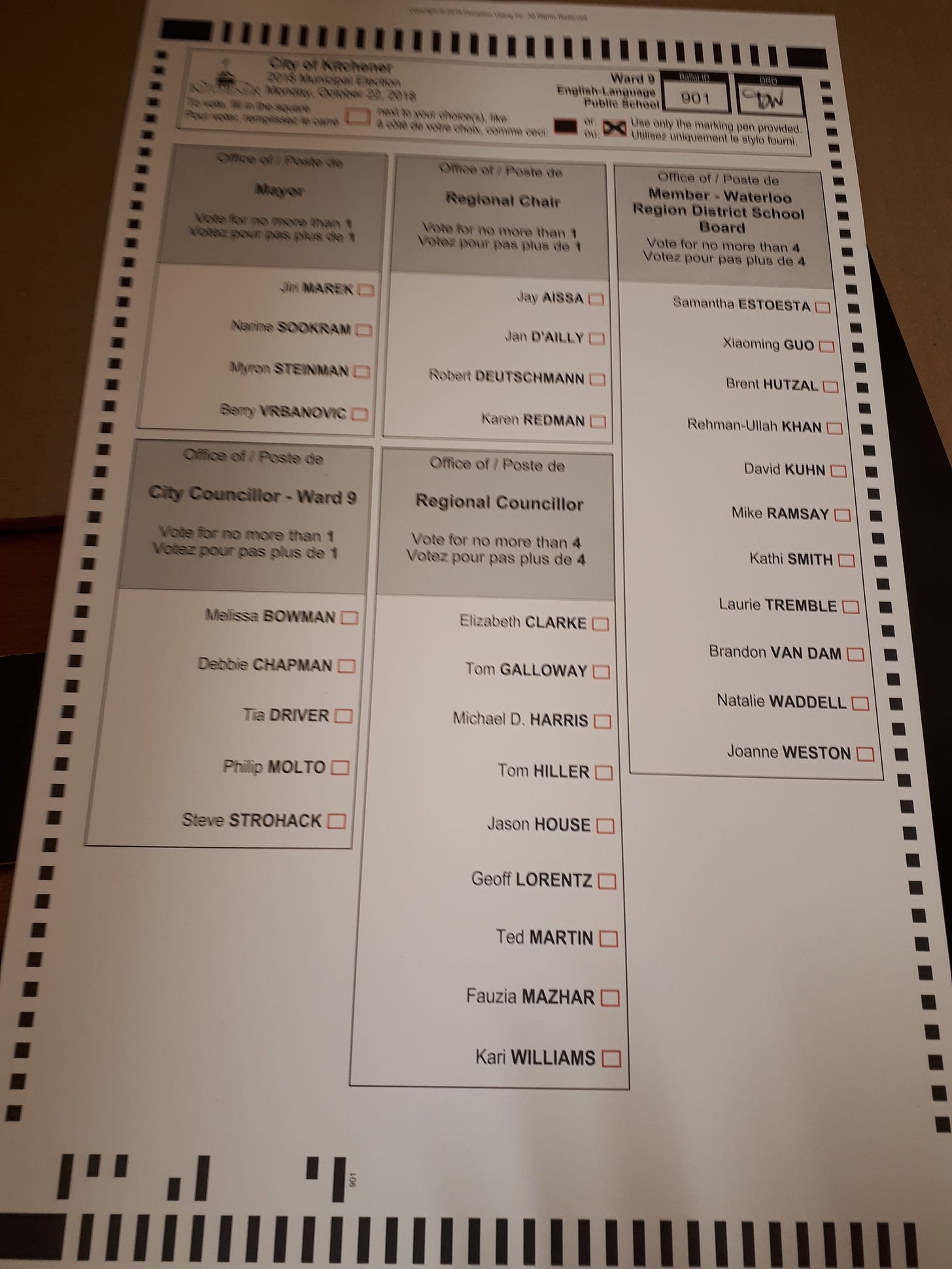To the polls!
It's time to get out there and vote
Election Day is only a few days away, so let’s take a look at some of the logistics around voting on Monday.
First off, in order to vote in a municipal election, you must meet these criteria on election day:
Be a Canadian citizen (temporary and permanent residents cannot vote);
Be 18 years of age or older;
Not prohibited from voting under any law; and
Qualify to vote in the municipality
You can visit this online tool to check your voter registration. If your information is correct you will likely have received a voter card in the mail. Note that households with one voter, receive a voter postcard. Those with more than one registered voter, should receive an envelope with all of the voter cards included (addressed to one voter in the household).
If you received a voter notification card in the mail, bring that along with personal identification that shows your name, signature and address. Note that your voter notification card cannot be used as identification. You can show:
1 piece of identification that shows your name, signature and address; or
1 piece of identification that shows your name and signature and 1 piece that shows your name and address.
If you do not have acceptable identification you can still vote. You will need to fill out a Declaration of Identity – Form 9 and swear an oath before you can get a ballot.
If you are eligible to vote but do not have a permanent address, you can still vote. Your residence is considered to be the place where you most often returned to sleep or to eat (examples: hostel, shelter, drop-in centre) during the last five weeks.
You are entitled to three hours in which to vote on voting day. This does not mean you can take three hours off work, unfortunately. It means you’re allowed to be absent to give yourself three hours of voting time.
If you are a student and consider your home to be the place where you live when you are not attending school (that is, you plan on returning there), then you are eligible to vote in both your home municipality and in the municipality where you live while attending school.
Waterloo Region residents can also vote for school board trustees. There are four different kinds of school boards in Ontario:
English-language public school board
English-language separate school board
French-language public school board
French-language separate school board
No matter which school your children go to (or if you don’t have children), you are automatically eligible to vote for the English language public school board unless you take steps to change and become a supporter of a different kind of board.
Everyone can vote for school board trustees. You don’t have to have children in the school system, or even be a parent at all.
My three tips for Election Day:
Make a plan
Creating a plan for when and where to vote increases the likelihood that you will get out and vote on Monday. Develop a vote plan by asking questions such as:
What time will you be voting?
Where are you voting?
How are you getting there?
Do you need a ride?
Do you need to take off work or secure childcare?
Do you have all the necessary documents to vote?
Answering these questions will help you plan how to vote and ensure you are able to cast your ballot. Also, consider if neighbours or friends may need support in getting out to vote and offer help if you’re able (such as offering a ride to the polling station, or ensuring they have the information they need to vote).
Know who you are voting for and write it down
I mean, look at the size of this ballot from 2018. I think I heard some good things about that Melissa Bowman candidate in ward 9 ;) That’s a lot of names to remember and we have even more candidates running this year. It’s far too important of an issue to make a mistake in remembering names.
You don’t have to vote for all the positions
Some positions (such as mayor and ward councillor) only allow you to vote for one person. However, other positions (such as Regional Councillor and School Board Trustees) allow you to vote for multiple representatives. The ballot will tell you how many people you can vote for in each position. Note that you do not have to vote for every position though. If you don’t feel like you have enough information to knowledgeably vote for a person or position, just leave it blank. Your ballot is still valid even if you only vote for one person or position. However, you don’t want to accidentally give a vote to someone who doesn’t represent your values.
If you’re interested in learning more about voting in the municipal election, check out some of these great resources:
Waterloo Region Votes has all sorts of great resources and they make it easy for you to look up ward-specific information.
Settlement.org answers some of the most common questions related to voting in a municipal election.
If you want to dig in a little deeper, check out the 2022 Voter’s Guide.
Thanks so much for reading. Now, let’s get out there and vote!


